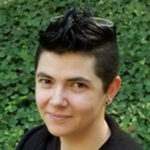Summer 2021
1
Greetings
Keats Chaves, Editor
Class of 2022
Greetings

Keats Chaves
Editor
Class of 2022
Sitting beside my computer right now—between my coffee and my cat—is an old, battered paperback copy of The Great Hunt, the second book in the late Robert Jordan’s epic fantasy series, The Wheel of Time, which I recently picked up again as “light” reading (the joke here being that each book is, on average, about seven hundred pages). Like many fantasy readers my age, I literally grew up with these books (the first one was released in January 1990, two months after I was born), and, as I’m rereading them, I’m also recognizing a strong influence on how I myself write fiction—from how I create worlds, all the way down to how I construct sentences. In essence, in rereading these lengthy tomes, I am revisiting where I began.
But what really got me thinking about beginnings—about where I started as well as how and why—is one very unique aspect of Jordan’s narrative structure. There are fourteen full-length novels in The Wheel of Time, and each book begins the same way: “There are neither beginnings nor endings to the turning of the Wheel of Time. But it was a beginning.”
For those of us at RWW, summer is our beginning: summer is when we scramble to prepare for our workshops, attend residency, and receive our mentor assignments for the coming year. Even for those of us graduating or retiring on August 1st, the summer residency is still very much a beginning as we move on into our lives and our careers as successful students, teachers, writers, and poets. In her faculty craft essay, “The Work is Not All That,” Barrie Jean Borich reminds us to pause in this search for writerly success and to reflect not just on our tangible end goals but on what is truly driving us in the first place.
We are also excited to welcome two new faculty members this year: Kelli Russell Agodon, featured in this issue, and Sequoia Nagamatsu, who will be featured in the Fall. In “Moving Gently in the World,” Contributing Writer Abriel Newton shares her interview with Kelli, who describes experiencing RWW as a participant now returning as faculty, as well as the importance of mentorship, inspiration, and paddleboarding.
This issue also features a photo essay by Hannah Comerford, looking back at a successful first year of RWW flash classes. We also celebrate the 2020-2021 book publications of our esteemed alumni, many of whom participated in a series of fantastic readings held during this previous mentorship year. In addition to this celebratory compilation, we recognize the accomplishments of all our RWW community members in the Publications, Announcements, Opportunities, and Literary Citizenship sections.
And now it is time for me to say Thank You to everyone on the Soundings crew for all their help, patience, and insight during my past year as Editor; as I move on to a new beginning in my role as Contributing Writer, please also join me in welcoming Hannah Markley as the new Editor of Soundings, and Elissa Favero as the new Assistant Editor.
Cheers, friends, and may you all have a happy beginning!
